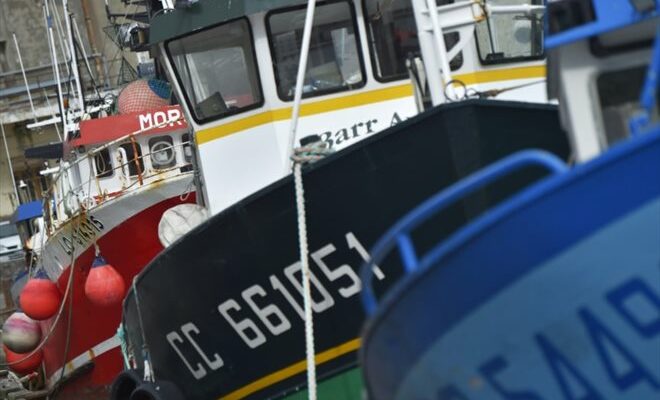Fishing boats at the port of Lorient, in Morbihan, May 11, 2020 (AFP/Archives/Loic VENANCE)
Will the fishing port of Lorient, the second largest in France, import fish from Oman by cargo plane? The idea, raised as part of cooperation with the sultanate, raises the hackles of fishermen and environmentalists in a sensitive period for French fishing.
“This controversy is still a shame, because it is the first time that a French port has exported in this way,” regrets Maurice Benoish, president of SAS Ker’Oman.
This company won, as part of a joint venture, a call for tenders to design and manage the port of Duqm, in the Arabian Sea, in the south of the Sultanate of Oman.
When the contract was won at the end of 2020, the news made little noise. Until the arrival this fall of an Omani delegation to the Itechmer exhibition in Lorient.
The mayor (UDI) of Lorient Fabrice Loher then welcomes “an opportunity (…) for the importation of fish”, according to the daily Ouest-France.
Mr. Benoish mentions, in the local press, a supply of fresh fish arriving by cargo plane from Oman.
“It was a possible financier who wanted to build an airline to import fish to Lorient,” he explains to AFP, while assuring that the importation of fish was not at all the purpose of the project. partnership with the sultanate.
“It’s about bringing our port know-how,” he explains, citing shipbuilding and repair, the sale of fishing equipment and training.
“Afterwards, if the fishmongers want it, they will have access to Oman that they have never had until now. The plane is a normal transport for fish today,” he believes. he.
Transport which, however, increases “the carbon footprint of fish by 10 times”, denounce environmentalists, who see in the partnership with Oman the “symbol of climate-killing economic development”.

Fishing boats at the port of Lorient, in Morbihan, July 12, 2017 (AFP/Archives/LOIC VENANCE)
“We are sacrificing the Lorient fishermen by going to create a structure which will compete with them. The question is: do we still want a fishing port in Lorient?”, scathes Damien Girard, leader of the left and environmentalists in Lorient.
– “Nonsense”-
For once, fishermen are on the same page as environmentalists.
“It’s nonsense to import fish from the Persian Gulf. Total rubbish!” denounces David Le Quintrec, Lorient fisherman.
The sailors are all the more upset as the port of Lorient, which plays a leading role in the partnership with Oman, is chaired by Olivier Le Nézet, who is also head of the Morbihan and Brittany fisheries committee and the national committee.
“By wearing multiple hats, he forgets his main role: to defend French fishermen!” fumes Stéphane Pochic, shipowner in Loctudy (Finistère).
Criticisms brushed aside by the person concerned. “It’s not Olivier le Nézet who is going to bring fish from Oman!”, he says, denouncing “a storm in a glass of water”.
“We are here to bring skills, period! The rest is literature,” he assures. Importing fish, “it’s a choice for a private company. I’m not going to decide for a fish trading company. If they want to do it, it’s their choice,” adds Mr. Le Nézet.

Second for fishing in France, the port of Lorient already imports large quantities of fish, for its fish merchants and processing factories (AFP/Archives/LOIC VENANCE)
Second for fishing in France, the port of Lorient already imports large quantities of fish for its fish merchants and processing factories. The port processes 80,000 to 100,000 tonnes of seafood each year, for only 18,109 tonnes of fish landed by fishermen in 2022.
In France, 80% of seafood products are imported. But air transport and community support for SAS Ker’Oman (in the form of repayable advances) fueled the controversy.
This partnership, “it is a very important opportunity to promote the skills of the country of Lorient in the field of the sea”, estimates Pascal Le Liboux, vice-president of Lorient Agglomération, speaking of a “small reimbursable advance” which will not cost the taxpayer a cent.
At the same time, “we are investing massively in the modernization of the port to ensure a future for Breton fishing”, assures the elected official, who promises that “there is no short-term plan to import fish from ‘Oman”.
“What will we do in 15 or 20 years? I don’t know,” he admits, because no one is able to predict “how the resource will evolve.”
© 2023 AFP
Did you like this article ? Share it with your friends using the buttons below.




